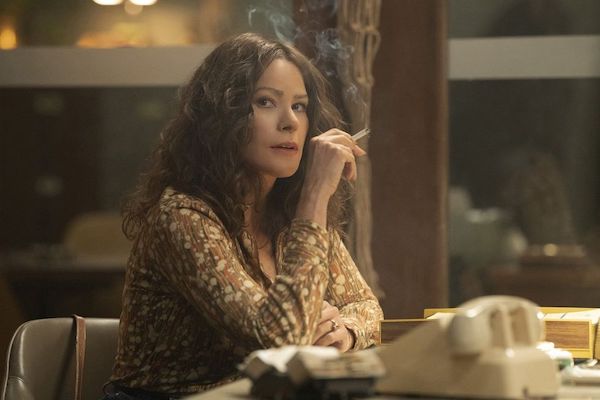WATCH CLOSELY: “Griselda” — Queenpin of a Criminal Empire
By Peg Aloi
Sofia Vergara’s performance as drug queenpin Griselda Blanco, in the limited series Griselda, is career-defining and unforgettable.

Sofia Vergara in the Netflix series Griselda.
If you’ve been wondering when the amazing Sofía Vergara (Chef) would finally get a juicy role equal to her enormous talent, then wonder no more. Vergara’s performance as Griselda Blanco, in the new Netflix limited series Griselda, is career-defining and unforgettable. The powerful, relentlessly ambitious creatrix of a narcotics empire in Colombia and later Miami, Griselda struggled to make a name and reputation for herself in what had long been considered a man’s world. Griselda is the brainchild of the producers of Netflix’s popular series Narcos (featuring drug kingpin Pablo Escobar) and is directed by Colombian film and TV director Andrés Baiz. Based on Blanco’s life, the show includes plenty of dramatized and fictionalized events and characters. The result is an addictive thrill ride — full of sex, drugs, violence, social intrigue, and suspense.
At the narrative’s beginning, Griselda is married with children. She is determined to leave her drug dealer husband in Medellín and escape to Miami. She asks her friend Carmen (Vanessa Ferlito) to help her get a fresh start with her three sons. But the travel agency job Carmen provides Griselda is not exciting or profitable enough. Having gotten a taste for the high-stakes world of cocaine, our antiheroine decides to make use of some ill-gotten Colombian contraband and seek her fortune.
Griselda takes place across several decades, tracing the cartel queen’s meteoric rise, from a hard-knock life on the streets to becoming the owner of a hugely profitable criminal enterprise. One instinct pays off well: Griselda’s realization that elite social events were fresh meat markets for wealthy new customers. The plot follows the money: the evolution of Griselda’s empire moves in tandem with the decadent ’80s. The decade began with powder cocaine flowing freely in the United States, a favorite among fat-cat partygoers; it ended with the rise of cheap, addictive crack cocaine, which became a scourge across poor communities. Griselda presided over the evolution of illicit appetites; her own struggles with vice occasionally parallel those of her customers.
Eventually earning the moniker “Cocaine Godmother,” Griselda undergoes a shift in her personal moral code, becoming increasingly tolerant of violence and vengeance as she accumulates enormous power and wealth. Despite her volatile temper, the drug queenpin remains unruffled during negotiations with competitors in other cartels, criminals who would just as soon kill her as collaborate with her. (Vergara is particularly good at conveying the intensity of this dissonance on her face at these moments.) But, as one betrayal after another piles up, Griselda begins to understand that she must choose her minions wisely. As she builds her team, chosen for their skills and loyalty, she embraces the primal need for wariness in what is a very deadly business.
One of the things Griselda does extremely well is to introduce characters in a very subtle, almost inconsequential way, yet adroitly teasing that these figures may become more important players at a later time. We first see Dario (Roberto Guerra) as a watchful bodyguard for one of Griselda’s rivals during a humiliating quid pro quo. He treats her with quiet respect, and he soon joins her team. His cool, calm control serves as an effective buffer for Griselda’s fiery nature. The shaggily handsome, charismatic Rivi (Martín Rodríguez) is rough eye candy at first, one of several buff henchmen. Later, he becomes Griselda’s agile right-hand man. The entire cast is first-rate, including Mexican-Colombian actor Christian Tappán in the pivotal role of Arturo, Griselda’s longtime friend and business partner. He is a steadfast helpmeet, patiently trying to help Griselda master her impulsiveness, and her increasingly self-defeating focus on victory over strategy.
Of course, Vergara is the queen of this court, and she plays Griselda with extraordinary range and depth. Her boss is unrelentingly feminine, even as she tangles with hardened criminals on a daily basis. Though the script takes some biographical liberties, this is an entertaining portrait of Griselda as an emotionally complex woman who becomes increasingly mercenary and egotistical.
The dialogue is roughly half in English and half in Spanish with English subtitles, an effective and natural choice. The gorgeous production design is full of authentic detailing. Particularly well showcased are the increasingly glamorous fashions that reflect Griselda’s upwardly mobile lifestyle; they repeatedly affirm the strength of her womanly wiles, as she holds court in silk charmeuse gowns and lingerie in pastel shades of cream and rose pink. Nuanced sociological touches like this — along with razor-sharp direction and glossy cinematography — elevate Griselda above genre crime thriller to the level of artful biopic.
Peg Aloi is a former film critic for the Boston Phoenix and member of the Boston Society of Film Critics, the Critics Choice Awards, and the Alliance for Women Film Journalists. She taught film studies in Boston for over a decade. She writes on film, TV, and culture for web publications like Time, Vice, Polygon, Bustle, Mic, Orlando Weekly, and Bloody Disgusting. Her blog “The Witching Hour” can be found on substack.

